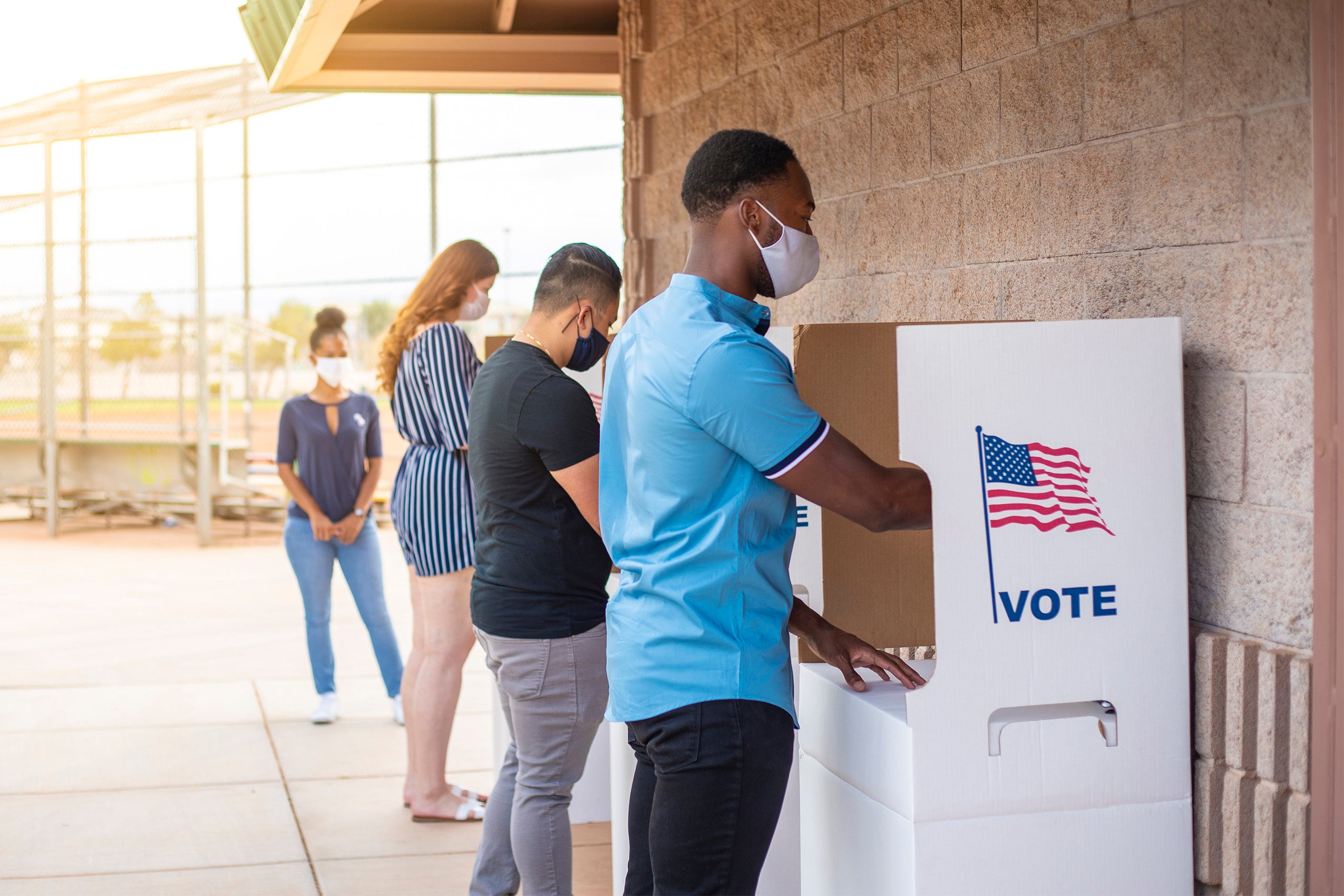
via the Harvard Gazette
by Alvin Powell and Colleen Walsh
President Joe Biden on Wednesday issued a call for national unity, devoting much of his inaugural address not to the policies and programs to come, but to the “uncivil war” that Americans must put behind them to tackle their myriad national challenges.
The Inauguration of Biden as the 46th president and of Kamala Harris as the first woman, African American, and Asian American vice president took place before a sparse, masked crowd and amid heavy security, both vivid reminders of two major challenges ahead: the COVID-19 pandemic that has killed 400,000 Americans, and angry opposition across the land, reflected in the storming of the Capitol just two weeks earlier.
During the ceremony that included welcoming remarks, music, and a poem by Amanda Gorman ’20, Biden acknowledged those critical challenges and others facing the country, including an economy devastated by the pandemic, continued racial inequality, re-energized white supremacy, worsening climate change, and strained international alliances. He repeatedly returned to the theme of American unity, echoing Abraham Lincoln who said, as he signed the Emancipation Proclamation, “My whole soul is in this.”
In response to an Inauguration Day that opens the door to massive shifts in America’s priorities, the Gazette asked Harvard faculty members for their thoughts on Biden’s speech and on his planned policies, as reflected through their specific fields of expertise, along with any advice they have for him in his “rare and difficult hour.” Here are their thoughts:
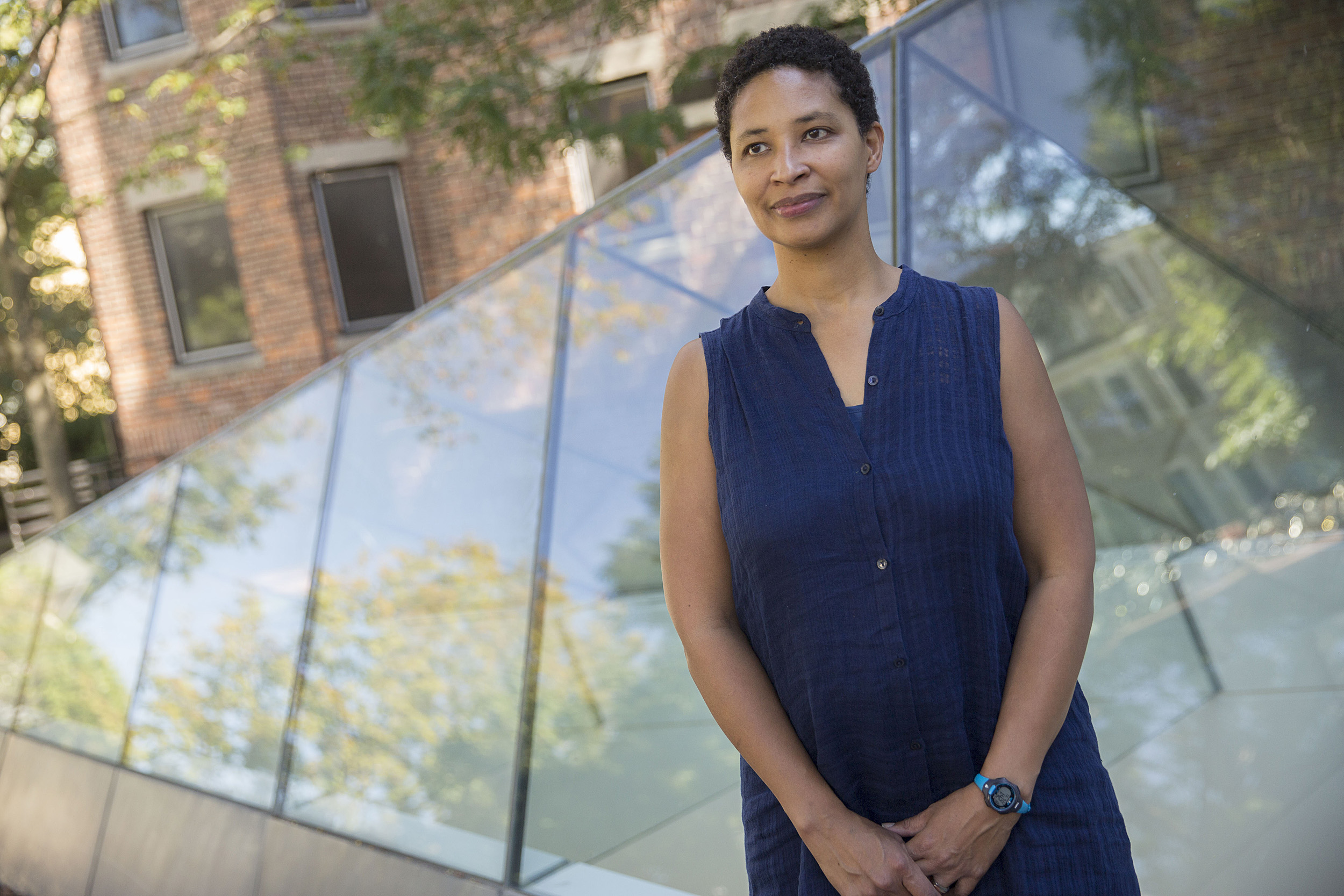
Danielle Allen
James Bryant Conant University Professor, Faculty of Arts and Sciences
I’m glad President Biden has chosen the theme of unity, though I think this is much more easily said than done. At the moment, many are collectively defaulting to the view that the main challenge we face as a nation is white supremacy. While clearly that is among our problems, it does not and cannot explain the 74 million people who voted for Donald Trump. Consequently, the work of hearing one another — which the president proposed to do — will be of the utmost importance. What valid concerns, within the bounds of fair play and commitments to constitutional democracy for all, are also motivating folks on the other side of the political line? For President Biden to deliver on these commitments, he’ll have to start hearing and making space for those voices too. And then will come the hard work of figuring out how we wrestle through our conflicts once they are honestly named.
Above all, I think the most important thing was President Biden’s commitment to be a president for the whole of the American people. The question for me is how that will manifest in how he forms committees and advisory groups. While there’s lots of other work to do on rebuilding a culture of adherence to the rule of law, it starts from a motivation to see and act on behalf of the general welfare. So, he is starting in the right place, and we need leadership from the top that embodies that commitment.
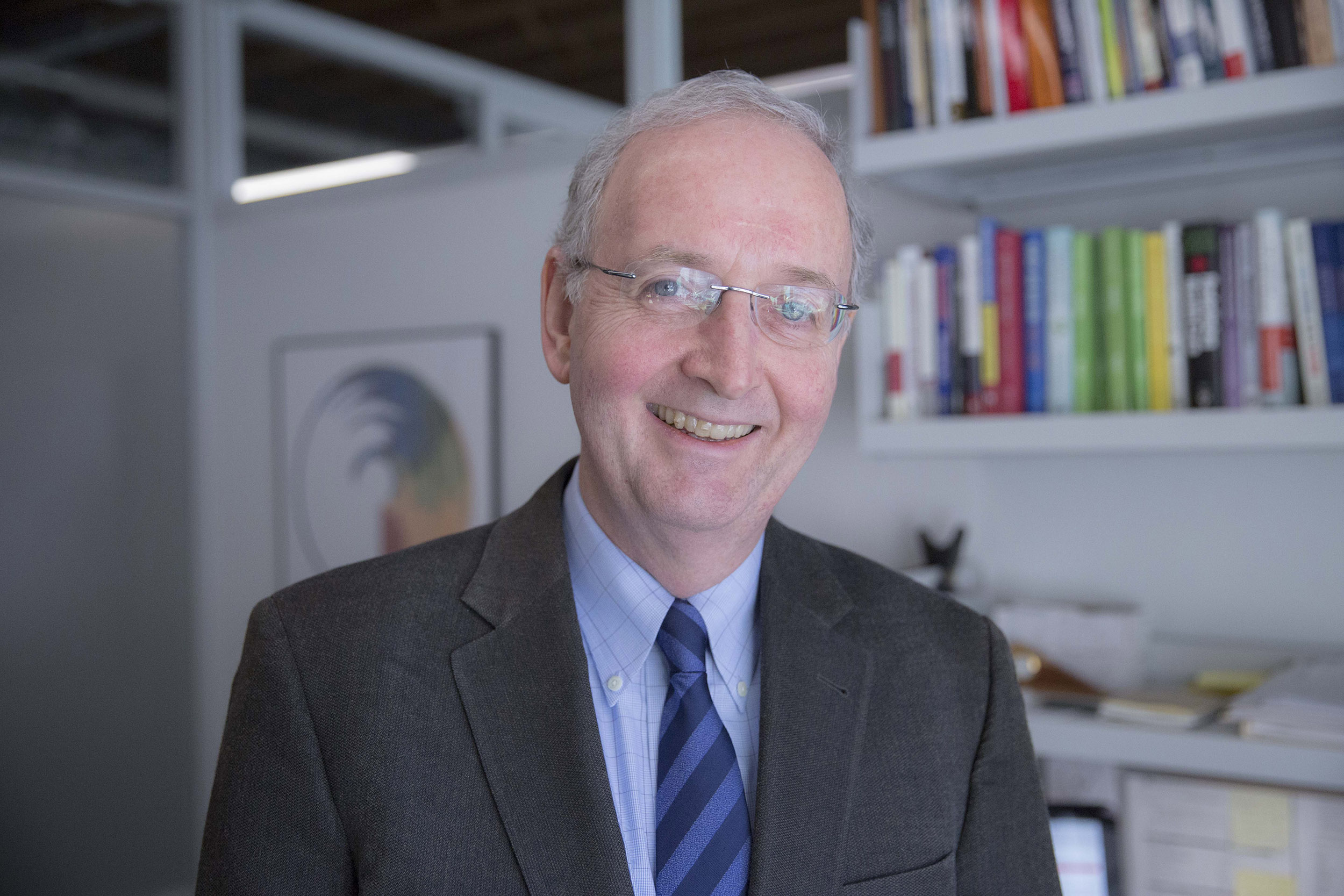
John McDonough
Professor of the practice of public health, Harvard T.H. Chan School of Public Health
When Gerald Ford became president in 1974 in the wake of Richard Nixon’s resignation due to the Watergate scandal, he announced: “Our long national nightmare is over.” For many of us, today’s inauguration of President Joe Biden is “deja vu all over again.” Another national nightmare brought down by still-functioning and strong elements of our democracy, especially the judiciary and a free press. After witnessing Watergate and the long line of senior federal policymakers who went to prison for their crimes, I found it more difficult then to take American institutions for granted. Washington, D.C.,’s imposing buildings and monuments give the impression of a formidable and indestructible national government. Watergate ripped that illusion from my 20-something eyes.
One legacy from the Trump era, I hope, will be generations of Americans under age 40 who now sense the fragility of our government and recognize the imperative for never-ending vigilance. The recent extraordinary voter turnouts on Nov. 3 and Jan. 5 (in Georgia) offer hope. President Joe Biden understands this challenge. “Politics doesn’t have to be a raging fire,” he cautioned in his inaugural address.
Two months shy of its 11th anniversary, the Affordable Care Act still stands as a living monument to the American people’s desire for a more humane and sustainable health system that continuously improves health and health care.
From its beginning, many saw shortcomings and flaws in need of correction. Since 2011, fixes have been impossible in a divided government. Razor-thin Democratic majorities in the House and Senate now provide, for the first time since 2010, the chance to improve benefits to vulnerable individuals and families who have gone without. Though the improvements will fall far short of the aspirations and vision of many who want an entirely new system, they will address key pain points affecting Americans every day. They also will set the stage for the next generation of necessary reforms.
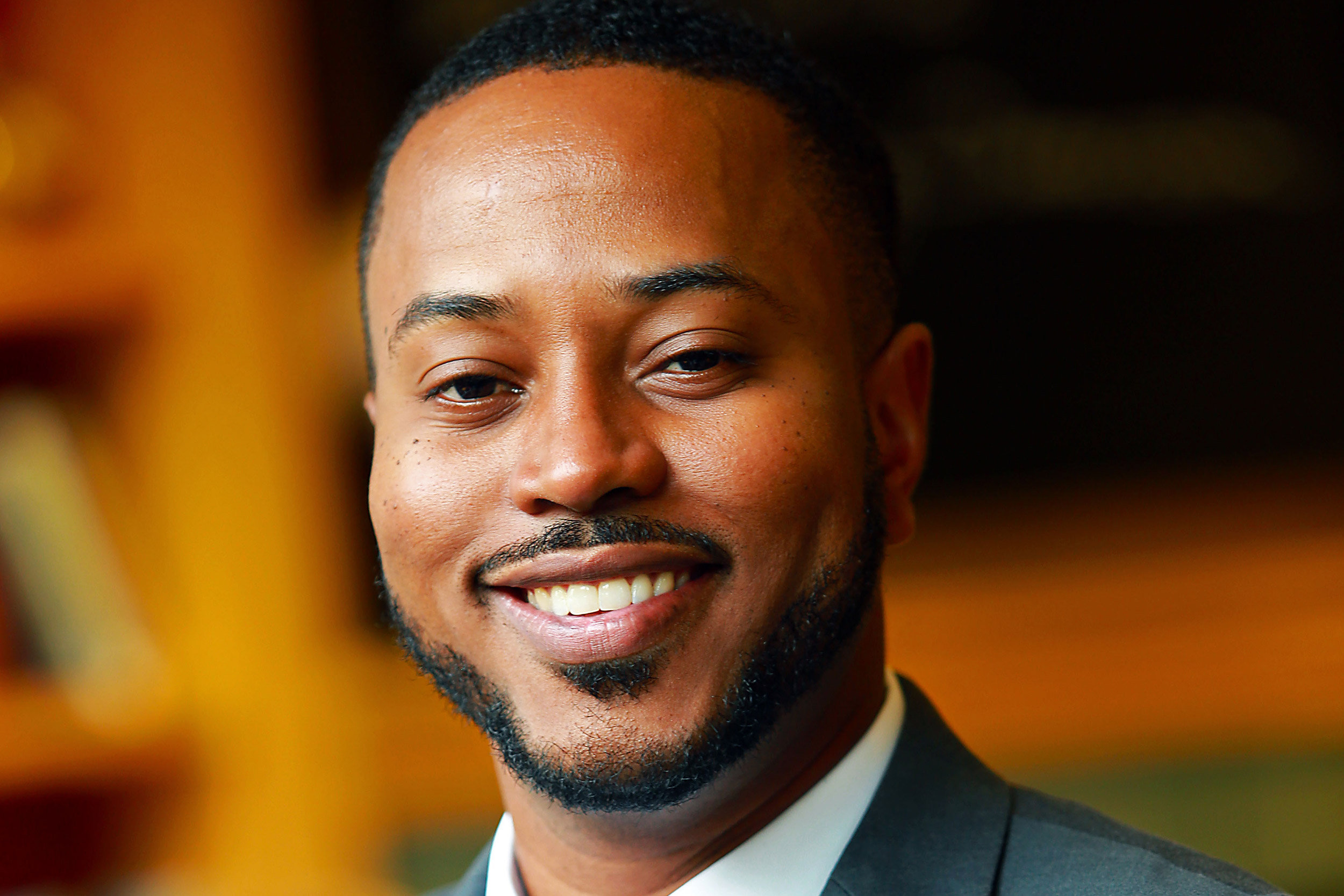
Peter Q. Blair
Assistant professor of education, Harvard Graduate School of Education
(Member of the presidential transition team, and the review team for the Council of Economic Advisers)
President Biden issued a soberly optimistic vision of America’s future. A clear message from today’s inauguration address is that the country must unite to defeat the pandemic and systemic racism, restore the economy for the good of all, and address the climate crisis, while ending the “uncivil civil war” that has been dividing the country along political and racial lines.
I am optimistic that, if implemented faithfully, President Biden’s education agenda can transform the future of education in the U.S. At the core of this agenda is increasing teacher pay, providing more support staff — e.g., nurses and counsellors — investing in school districts that serve minority students and low-income students (which have been historically underfunded), and investing in vocational training through reimagining high schools and supporting community colleges.
My colleagues and I at the Harvard Project on Workforce are researching these policies. In our work, we have found that 1) community colleges are clear pathways to economic mobility for millions of students, 2) reimagining how we measure and remunerate skills in the workforce can reduce racial barriers in the labor market, and 3) increasing school funding, particularly money spent on teacher salaries, is valued by families. Importantly, as his chief economic advisor, President Biden has nominated an economist of education, Cecilia Rouse ’86 and GSAS ’92, who has a distinguished scholarly record of studying the important role of community colleges in higher education and the impacts of education policies aimed at helping children in K-12.
With the first lady, Dr. Jill Biden, a professor at a community college, I am even more hopeful that support for community colleges will be an important priority for the Biden-Harris administration. As someone who got my start at a two-year college, I am excited that many more students will have the same opportunity that I had to start their educational journey at a well-funded community college. Going forward, it will be important to have a strong agenda to fund historically Black colleges and universities (HBCUs) and other minority-serving institutions. These institutions are unique in their ability to produce both high-quality and high quantities of minority scientists, teachers, politicians, and Civil Rights leaders. Vice President Kamala Harris, a Howard alum, and Rev. Dr. Martin Luther King Jr., a Morehouse alum, are two shining examples of why HBCUs are essential.

Erica Chenoweth
Berthold Beitz Professor in Human Rights and International Affairs, Harvard Kennedy School, and Susan S. and Kenneth L. Wallach Professor at the Radcliffe Institute for Advanced Study
In his speech, President Biden laid out a vision of the nation that reflects both boldness and pragmatism. He did not sugarcoat the daunting challenges that his administration is inheriting: the pandemic, the climate crisis, systemic racism, a militant anti-democratic movement, an assault on the truth, the urgent need for economic relief for working families, economic inequality and instability, and diminished status and credibility on the world stage. But the president promised bold action to respond to them. Just as importantly, he expressed his deep commitment to servant leadership, saying that his “whole soul is in it,” and he called on everyone in the country to live up to its highest aspirations by coming together in unity.
Such calls for unity can often sound like accepting the unacceptable. But in this speech, it seemed clear that Biden was calling for people to unite to reject the unacceptable to pursue justice itself. By centering moral leadership, truth, justice, possibility, and courage, Biden delivered precisely the message the nation needed to hear to join together and respond to our problems going forward. President Biden and Vice President Harris have their work cut out for them, but the inaugural events themselves seemed to restore a sense of reverence for their offices and conveyed humility regarding the responsibilities they entail. That’s a good start.
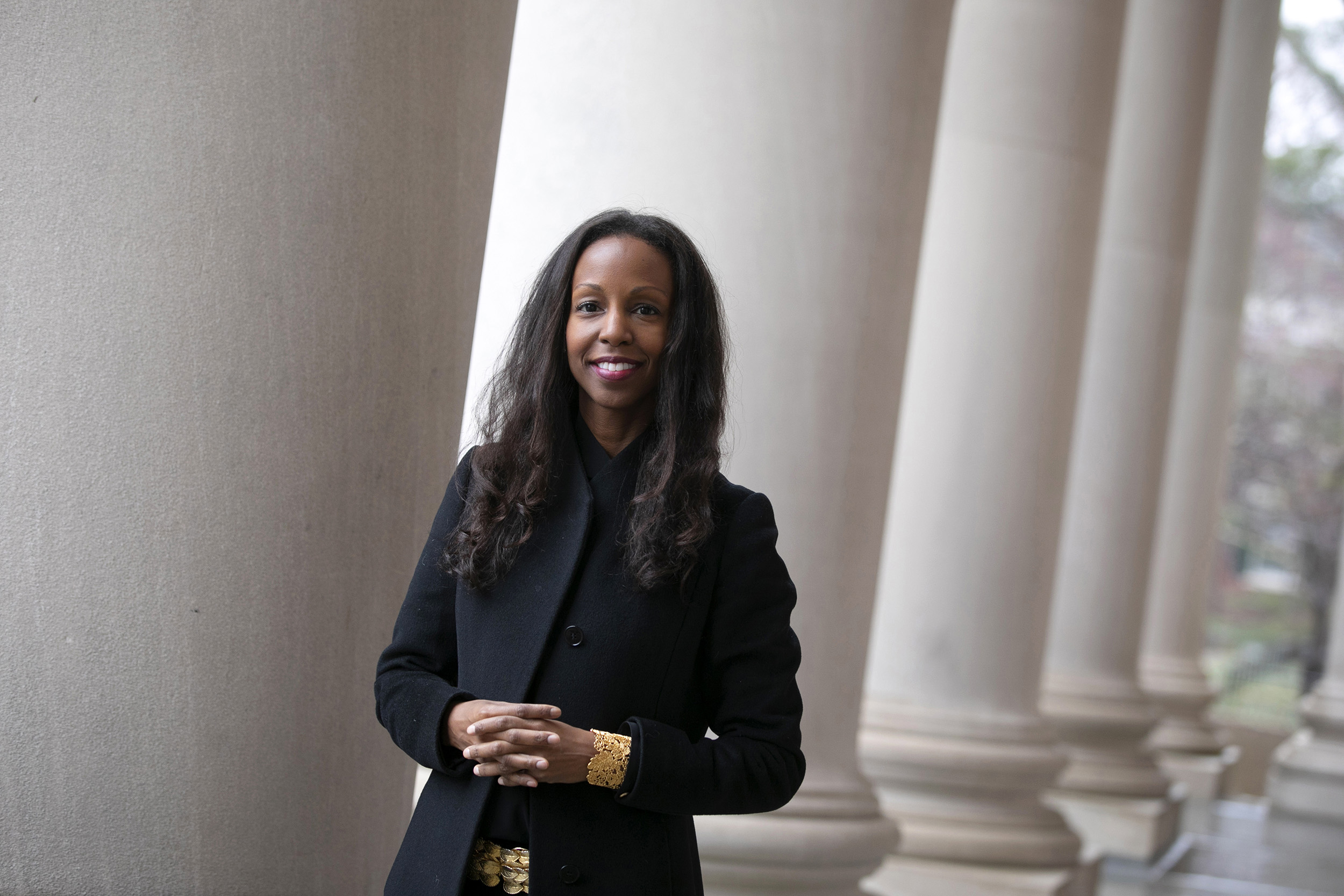
Sarah Lewis
Associate Professor of History of Art and Architecture and African and African American Studies, Faculty of Arts and Sciences
We tend to hear little in any inauguration address about the arts and humanities since, in effect, the solemnity, power, spectacle, and majesty is brought about by the sheer force of the total work of art in the carefully planned and choreographed ritual of the inauguration program itself. This event only dramatized that fact, with the 2021 installation of flags to honor the uncontrolled pandemic and the lives it has taken from us, and with the stunning poem by Harvard graduate Amanda Gorman, all of which took place on the symbolic grounds of the scene of the deadly insurrectionist attempted coup just days ago, under the dome of the Capitol, completed during the Civil War. The entire inauguration was so replete with symbolism that one wonders why we need to discuss the power of the arts and humanities at all.
What struck me was that President Biden’s speech did mention the arts and humanities, as I see it, quite explicitly in two ways. First, in what he emphasized was his initial act as president, he asked the nation to join in “a moment of silent prayer” to “remember all of those who we’ve lost in this past year to the pandemic, those 400,000 fellow Americans, moms, dads, husbands, wives, sons, daughters, friends, neighbors, and coworkers. We’ll honor them by becoming the people and nation we know we can and should be.” This is the first time in the history of this pandemic that we have had anything like a moment of collective mourning for nearly the same number of Americans who died during World War II from the sitting president. To move through pain, one must learn to see it. In the history of crises of this kind, with fatalities this large, it has always been the images, the culture that have made siege on this scale comprehensible, President Biden understood that, and demonstrated it powerfully one more time.
The second instance came as President Biden made clear that he sees the major challenges of his administration to be COVID-19, racial justice, climate change, and political extremism. He framed his approach to “these cascading crises of our era” in a way that the audience might not have expected: with the coalescent force of a well-known verse from “American Anthem.” It is not incidental that he explained his approach with reference to a song, citing a few bars: “The work and prayers of centuries have brought us to this day. What shall be our legacy? What will our children say? Let me know in my heart when my days are through. America, America, I gave my best to you.” To frame it, to understand the stakes of these crises, President Biden turned to the power of comprehension that the arts offers in times of crisis, particularly history that contends with the unspeakable. He also underscored the gravitas of this moment in history by finding the most effective ways to create a collective vision for the nation — through ritual and the culture. Rituals, he reminded us, are not auxiliary to life, but help sustain it, offering narratives that focus the moral imagination of civic society.
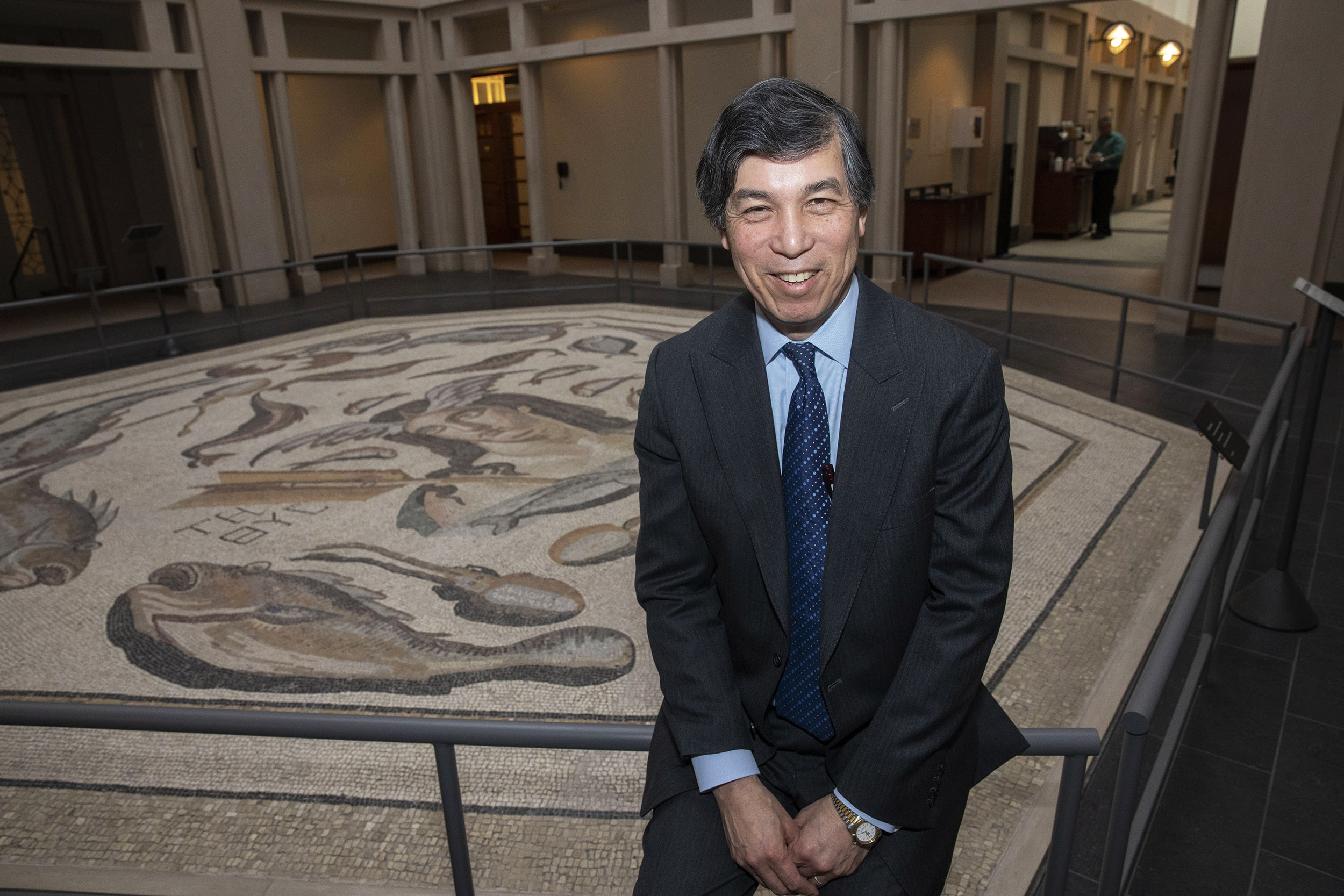
Willy Shih
Robert and Jane Cizik Professor of Management Practice in Business Administration, Harvard Business School
I thought his vision was really aspirational, about uniting the country and making it “the nation we know we can and we must be.” He acknowledged the divisions, and pointed to a long history of struggles, but added how “our better angels have always prevailed.” I always tell my students that leadership sets the tone, and as president this is one of his most important responsibilities. Today was a good start.
Biden had a message “to those beyond our borders,” many of whom have watched what is going on in the U.S. with dismay. I think his talk about repairing our alliances and engaging with the world again is very positive, especially when it comes to dealing with complex issues like trade, which are going to a need a multilateral approach, one that is strategic, not transactional. I think there is bipartisan recognition of issues regarding China, but at the same time we need to recognize our strong interdependency with China, which I think is underappreciated. The record U.S. imports from China over the last six months highlight a lack of alternatives for the near term. At the same time, there are many critical technologies that Chinese companies import from the U.S. We need each other, and it is better for both countries if we can defuse some of the tensions.
Restoring a sense of fairness in international trade should be an important objective, in my mind. While China has followed a path of development taken by Japan, Korea, and other developing countries in the past, it is now the second-largest economy on the world, and it can hardly be considered a developing economy anymore. It is a good time to discuss with our allies how we might reform global trading rules to reflect today’s realities and strive toward a level playing field.
When he talked about engaging with the world again, the president spoke of not so much addressing yesterday’s challenges, but today’s and tomorrow’s. I think he should ask how to ensure American leadership in technologies of the 21st century, especially the life sciences and crucial platforms like semiconductors, and how to translate that into jobs for American workers and communities. We should strengthen areas where the U.S. leads, and not lose them as we have with other sectors. I would look for early wins where he can achieve bipartisan support as a way of building confidence in a problem-solving process. I am always struck by how there are more values, beliefs, and goals that people across the country whom I have talked to hold in common than divide us.
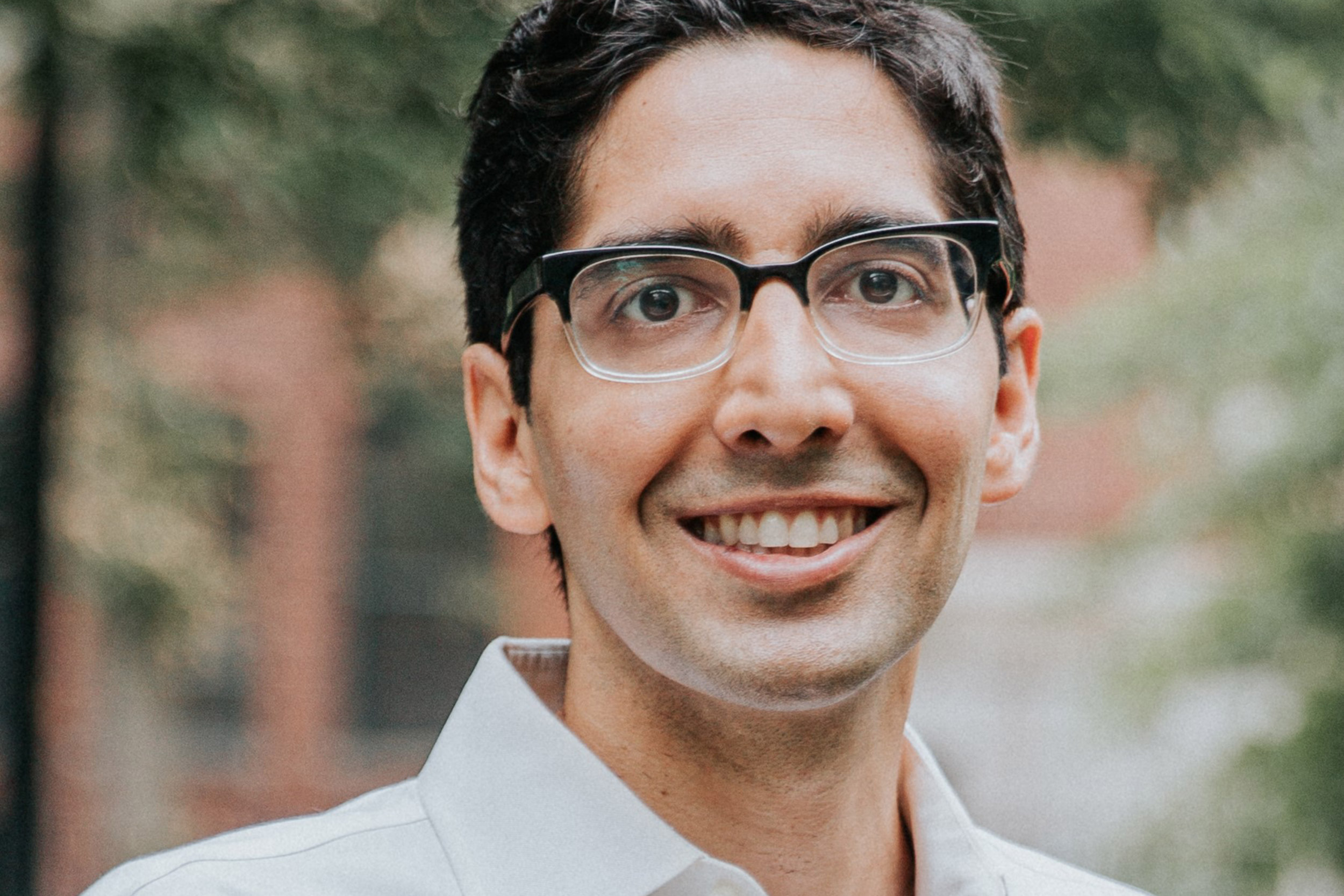
Sameer Ahmed
Clinical Instructor, Harvard Immigration and Refugee Clinical Program, Harvard Law School
I am cautiously optimistic for President Biden’s vision as it relates to the future of immigrants in the United States. I am heartened that his inauguration address focused on attempting to achieve “the American ideal that we all are created equal” and push back against “the harsh ugly reality that racism, nativism, fear, demonization have long torn us apart.” This ugly reality was perhaps no more evident than in the Trump administration’s anti-immigrant agenda over the past four years. In his first day in office, President Biden took important steps by issuing a handful of executive actions to address some of the worst aspects of Trump’s policies, including ending the Muslim ban, defunding the border wall, and preserving DACA (Deferred Action for Childhood Arrivals).
But President Biden must not only address the harms created by the Trump administration. He should ensure that immigrant communities are stronger and safer than they were four years ago. It is important to remember that President Obama deported more immigrants than any president before him. And while Americans were justifiably horrified about the Trump administration’s policy of separating children from their parents at the U.S.-Mexico border, almost every deportation tears individuals away from their families and communities, often permanently.
By sending an ambitious immigration reform bill to Congress on his first day in office, President Biden has sent a strong signal that he recognizes the important role that undocumented persons play in American society, and the need to provide them permanent legal status and a path to U.S. citizenship. While such lasting change will require congressional action, President Biden can and should do more to protect immigrants in the meantime. For example, he should make good on his campaign promise for at least a 100-day moratorium on deportations. While the Biden administration has indicated it may prioritize deportations of those with criminal history or alleged to have “national security” concerns, if it truly wants to overcome the “sting of systemic racism,” as President Biden indicated in his inaugural address, it should recognize that the systemic racism inherent in America’s criminal justice and national security policies has unfairly targeted immigrants of color for deportation. All individuals deserve a chance for rehabilitation and to remain living and thriving in the United States with their families, friends, and communities.
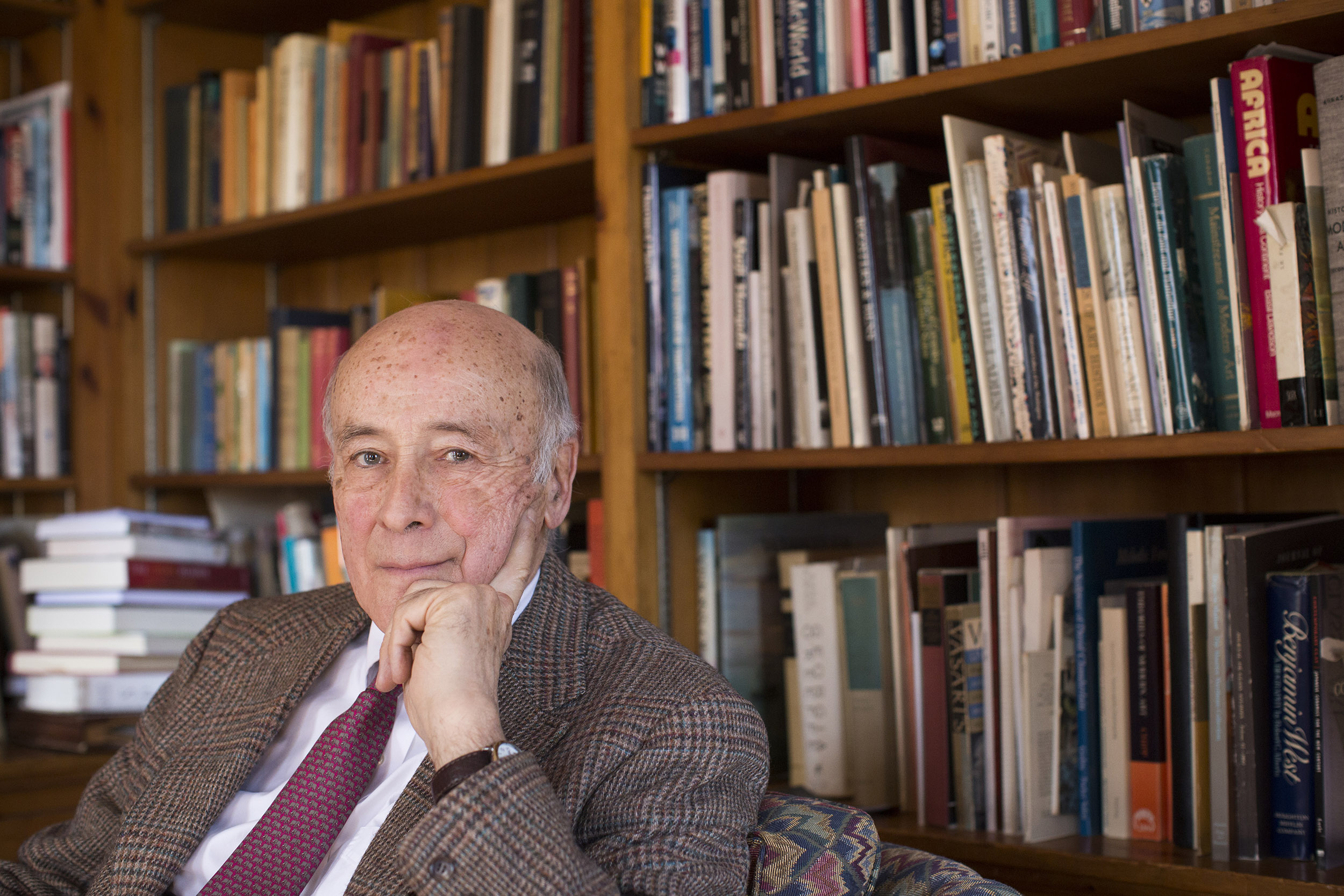
Joseph Nye
University Distinguished Service Professor, former dean, Harvard Kennedy School
The symbolism of Biden’s inauguration outdoors at the Capitol and his speech about unity were just what the nation needed after a year of pandemic deaths and bitter political struggle. While he did not have the rhetorical flourish of a Lincoln, FDR, or Kennedy, Biden hit all the high notes he needed just as surely as did the popular singers and the stunning young poet included in the ceremony.
This was a first and important step toward restoring America’s reputation and soft power abroad. Now he must continue in this vein.
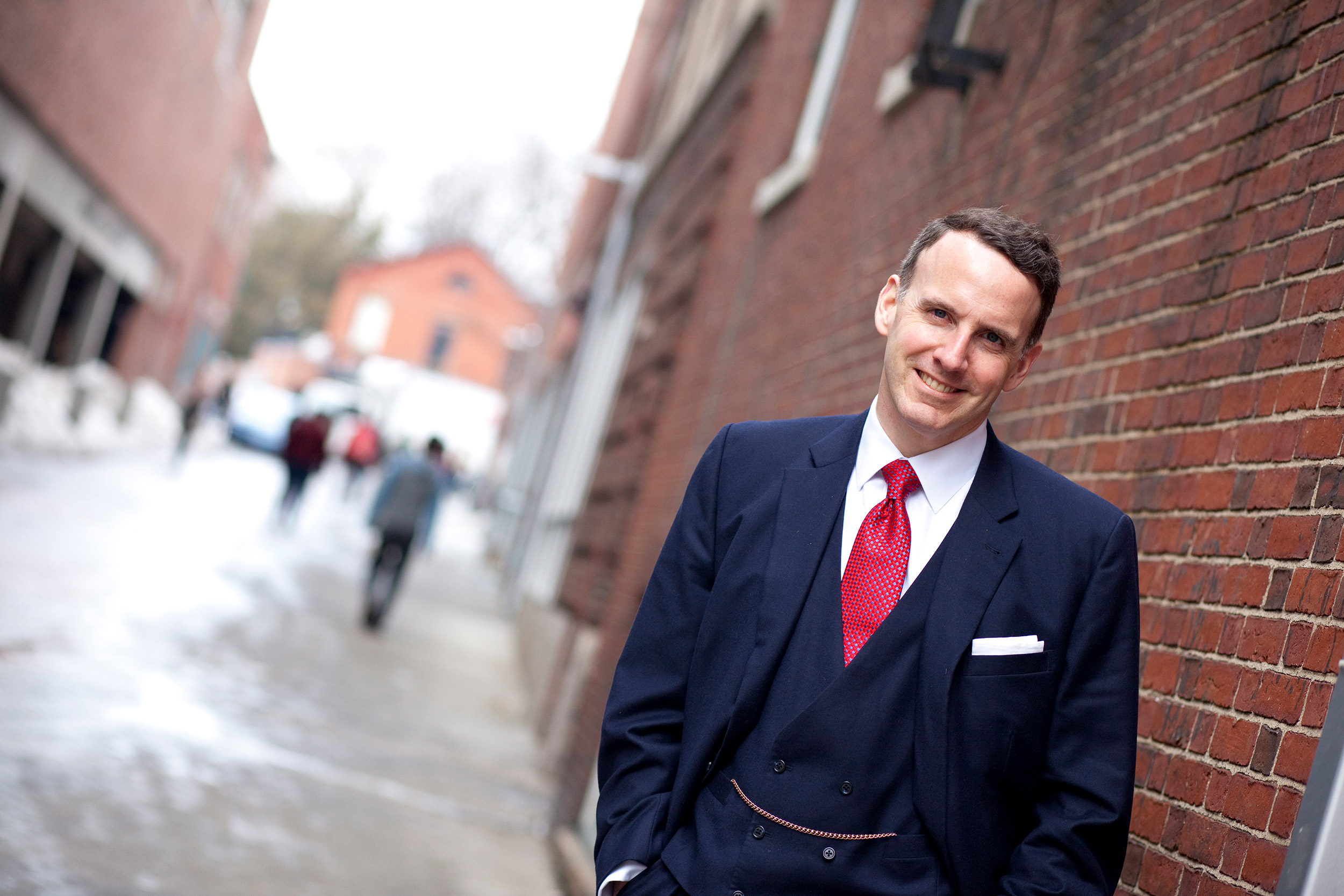
Edward Glaeser
Fred and Eleanor Glimp Professor of Economics, Faculty of Arts and Sciences
President Biden used his inaugural address to celebrate the “cause of democracy” and gave few clues about his policy priorities, other than his desire to “put people to work in good jobs,” and “overcome the deadly virus.” Nonetheless, infrastructure is sure to be at the center of “Amtrak Joe’s” agenda. Infrastructure spending’s bipartisan appeal makes it naturally attractive to a president who is trying to unite the nation.
Biden in his campaign promised to “mobilize American ingenuity to build a modern infrastructure and an equitable, clean energy future,” with a plan that pitches infrastructure as a way “to invest in middle class competitiveness.” The unnerving part of the Biden plan is that it pretty much promises to invest in everything from e-scooters to broadband. While infrastructure is important, it is also an opportunity to waste trillions.
Here is how President Biden can reduce that risk:
First, only fund projects that have been subjected to cost-benefit analysis by the Congressional Budget Office or an equivalently serious public entity. Just because the Erie Canal was a great investment doesn’t mean that all bridges and roads are great investments.
Second, subsidize as little as possible. Drivers should pay for roads. Flyers should pay for airports. Otherwise, we artificially encourage people to overuse energy and create congestion. Many air travelers are rich. Why should taxpayers pay them to use more carbon?
Third, remember the joke that 40 years of transportation economics at Harvard can be boiled down to four words: “bus good, train bad.” Buses are cheap and flexible. Trains aren’t. Trains reached their apogee before World War I. An autonomous bus on a dedicated lane provides a 21st-century alternative that combines the speed of most trains with a far lower cost.
Fourth, don’t get confused by other objectives, like rebooting Rust Belt cities, that have little to do with roads, rail, and broadband. That type of thinking gave us Detroit’s absurd People Move monorail. Then as now, Detroit needs better schools and safer streets, not more movement.
Fifth, focus on costs. Building American infrastructure costs far more than it did and far more than in other countries. Before you spend, put together a task force to find out how to get more for our money.

George Q. Daley
Dean, Harvard Medical School
I am encouraged and inspired by President Biden’s reaffirmation of democracy, call for unity, defense of truth, and pledge that the “dream of justice for all will be deferred no longer.” I applaud his commitment to securing health care for all and his selection of supremely qualified scientists and physicians as advisers, including our colleagues Rochelle Walensky to lead the Centers for Disease Control and Prevention and Eric Lander to serve as science adviser and lead the Office of Science and Technology Policy, now a cabinet-level position.
These decisions demonstrate his dedication to confronting the immediate challenges of our time — notably the COVID pandemic and climate change — with rigor and evidence-based policy.

Maya Sen
Professor of Public Policy, Harvard Kennedy School
Whether you agree with his politics or not, President Trump was very effective at changing the composition of the federal judiciary. In terms of the U.S. Supreme Court, Trump was able to appoint three out of the Court’s nine justices: Neil Gorsuch, Brett Kavanaugh, and Amy Coney Barrett. This is going to have a huge impact, particularly considering that Coney Barrett replaced one of the court’s liberal legends, Ruth Bader Ginsburg, solidifying conservative control over the court for years to come.
Maybe something that more often flies under the radar is President Trump’s imprint on the lower federal courts, which decide many important issues, from environmental law, to immigration, to Civil Rights. In only four years, President Trump was able to appoint more than 50 federal appeals judges, which is a number that’s close to the number of appeals judges appointed by Barack Obama in his eight years. President Trump was also able to “flip” several appeals courts from having a majority of Democratic-appointed judges to having a majority of Republican-appointed judges. Frankly, his impact on the courts will likely be one of his most important legacies.
For President Biden, the challenge is to restore more of an ideological balance on the courts. Many of Democratic-appointed judges are older and have been waiting to retire. This will be a great opportunity for President Biden to make some important appointments to these lower federal courts. I also suspect that Justice Stephen Breyer, the oldest member of the Supreme Court’s liberal wing, will soon come under intense pressure to retire. Although that won’t change the ideological balance on the Supreme Court, replacing Breyer with a Biden appointment would provide some assurances to progressives and liberals.
President Biden will face a number of urgent policy decisions, including key orders on immigration, climate change, foreign policy, Civil Rights, and others. But there is one thing that keeps me and other political scientists up at night that should not get lost in the excitement of this new administration: the disturbing trend toward anti-democratic norms, both among political elites and members of the public. We know that President Biden is entering office in a uniquely polarized time in American history. But pure party polarization doesn’t explain exactly what’s going on. Research in political science has shown that the Republican Party has in recent decades moved sharply to the right; with that shift has come a greater embrace of anti-democratic tendencies within the party’s extreme right wing. The attempts on Jan. 6 to overturn a fair and free election show that the country faces an undeniable threat from these forces.
It might be easy for President Biden to look away and focus on his domestic and foreign policy goals. But I think this would be a mistake. Shoring up and expanding voting rights — in particular passing the John Lewis Voting Rights Advancement Act — along with working to remove partisan incentives from the administration of local elections, limiting the ability of states to engage in partisan gerrymandering, and working to limit the pernicious effects of disinformation would go far in terms of addressing these underlying problems.
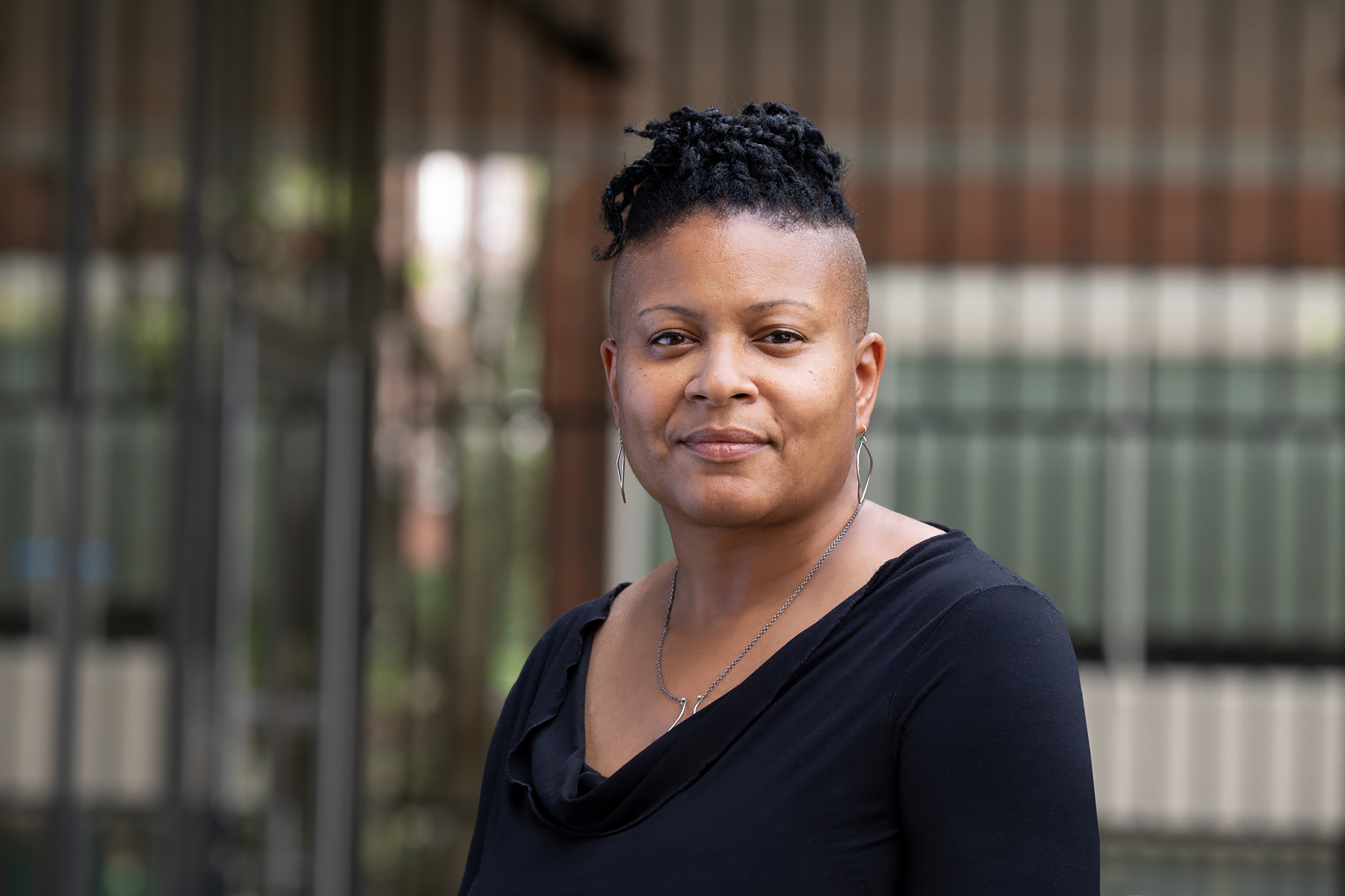
Sandra Susan Smith
Daniel & Florence Guggenheim Professor of Criminal Justice, Harvard Kennedy School, Carol K. Pforzheimer Professor at the Radcliffe Institute for Advanced Study
During his inaugural address, President Biden called for boldness to address each of the many crises we currently face: the pandemic, climate change, economic recession, deep political division, and racial and social injustices. Although a number of Biden’s proposals might reasonably be called bold — for instance, if passed, his emergency economic proposals should immediately and significantly help to unburden American families currently struggling mightily (and often failing) to make ends meet — bold is not the term that comes to mind when considering Biden’s remarks on reforms to our criminal legal system, especially those related to police and policing reforms. On this topic, frankly, the word that comes to mind is dodgy.
Biden acknowledges the systemic injustices in law enforcement that have contributed to generations of racial inequities. Still, when queried about how he would tackle these systemically rooted injustices, Biden leads with cliches: While there are bad apples, the overwhelming majority of police officers are good and should be defended. To improve policing outcomes, we need only invest more, not less, in police agencies across the country, focusing on better training.
Of course, it matters little how many good police officers there are if the institutions in which they are embedded are infected with racism and classism. But there is also ample evidence that where Black and Latino people are concerned, most officers are also infected with implicit and explicit racial and class biases. Institutional and interpersonal racism and classism combine to yield inequitable and often brutal treatment by the police, too often with deadly results. Recently we have seen evidence of this in how police agencies treated peaceful Black Lives Matter protesters, how police officers collaborated with white militia groups to control, contain, and terrorize these same peaceful protesters, and in the growing evidence that a not insignificant number of police officers across the nation have allegiances to, or sympathize with, white supremacist groups.
Given all of this, Biden’s plan to leverage his deep ties with both law enforcement and Civil Rights groups to bring them together to work things out seems timid, not bold. It also seems destined to fail. To avoid failure, Biden must focus on significantly weakening the political power and influence that police agencies have while also advocating for much greater accountability for the troubling disparities in treatment produced by individual officers and the agencies within which they are embedded. He should also seriously consider investing in the development of alternative and effective approaches to achieving public safety without police. In recent years, a number of innovations have emerged and show great promise. Nothing short of these suggestions would come close to boldness, but tackling this intractable problem in these ways just might.
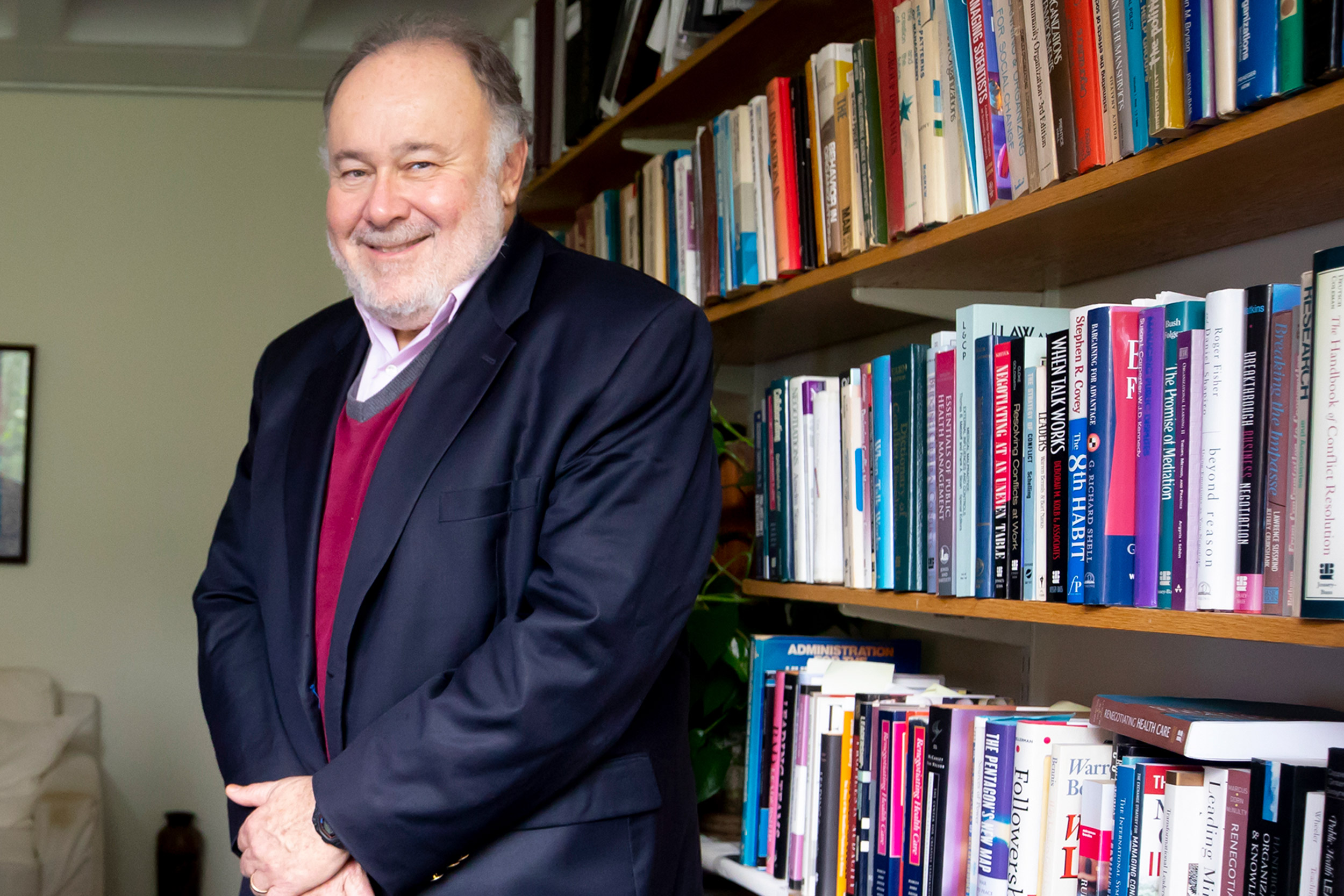
Leonard Marcus
Co-director of the National Preparedness Leadership Institute (NPLI) and lecturer on public health practice, Harvard T.H. Chan School of Public Health
During these past two weeks, our country coped with and overcame an unprecedented and remarkable crisis. On Jan. 6, the Capitol was ravaged and desecrated by domestic terrorists. Two weeks later, that same building played its traditional role, the setting for our country’s most important and sacred ceremony, the peaceful and dignified transfer of power between presidential administrations.
On both sides of the political equation, crisis leaders mobilized to do just what we teach at the NPLI: develop quick and comprehensive situational awareness in a chaotic and compressed time period; build connectivity of effort among different agencies and organizations responsible for the safety and security of the inauguration; and forge rapid confidence in the security system that was developed. That confidence assured the nation and its leaders in the safety and security of the inauguration. It also was a clear and powerful message to adversaries, domestic and foreign, that any attempt to disrupt the inauguration would be met by a strong and overwhelming force.
Over these tense two weeks, NPLI faculty were in very close and regular contact with senior leaders on both sides of this equation — the Trump team and the Biden team — and are collecting the lessons learned to teach and transmit to other crisis leaders, who must now be prepared for the new normal of the post-Jan. 6 experience.
These responses may have been lightly edited for clarity and brevity.
Filed in: Clinical Spotlight, Clinical Voices
Tags: Harvard Immigration and Refugee Clinical Program, HIRC, Sameer Ahmed
Contact Office of Clinical and Pro Bono Programs
Website:
hls.harvard.edu/clinics
Email:
clinical@law.harvard.edu